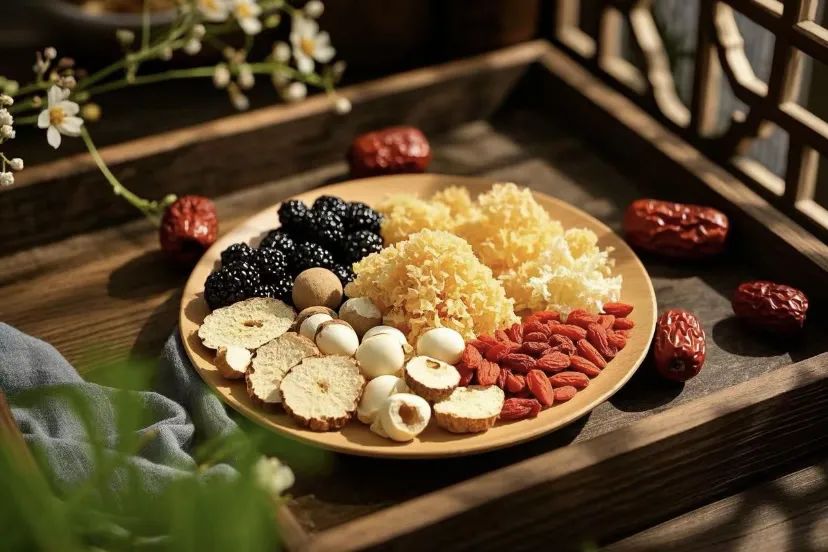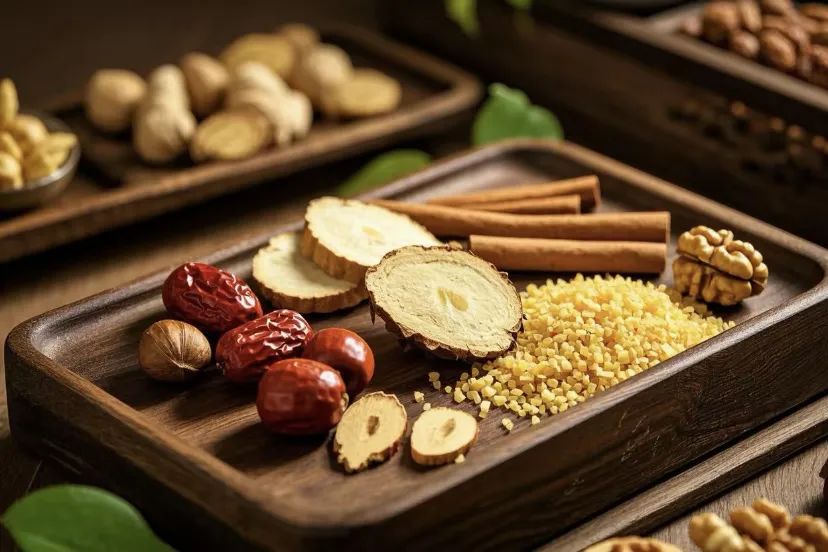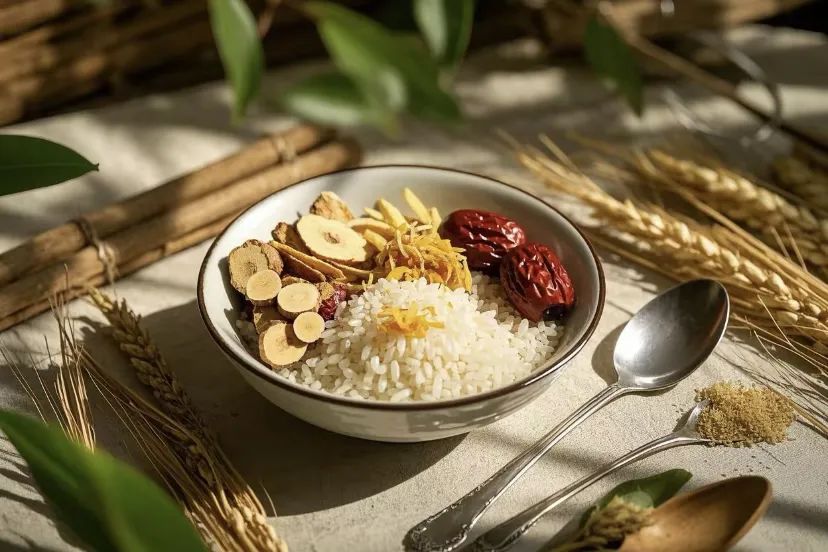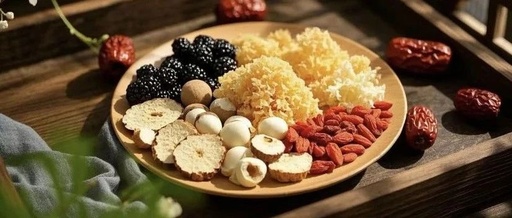Porridge suitable for drinking in spring.
Take a seat and listen carefully!
First type: Yin Deficiency Constitution:
Millet (Xiao Mi) Huai Shan (Chinese Yam) Silver Ear (Yin Er) Goji Berries (Gou Qi) Mulberries (Sang Shen) Lotus Seeds (Lian Zi)

The main manifestations of Yin deficiency are dryness: dry mouth, dry skin, dry eyes, dry throat, and a red tongue with little or no coating.
At night, you may feel heat in your palms and soles, prone to night sweats, easily irritable, with frequent dry stools, and generally a lean physique.
If you identify with these symptoms, you are likely to have a Yin deficiency constitution.
The five ingredients nourish the Yin of the five organs.
Millet: Rich in protein, vitamins, and other nutrients, it has the effects of strengthening the spleen and stomach, nourishing Yin and blood, and is easy to digest and absorb when cooked as porridge.
Huai Shan: Also known as Chinese yam, it contains amylase and polyphenol oxidase, which can strengthen the spleen and stomach, nourish the kidneys and essence, and benefit the lungs and relieve cough. It can be steamed, boiled, or stir-fried.
Silver Ear: Rich in dietary fiber and gelatin, it nourishes Yin, moistens the lungs, and generates fluids. It is often used in soups, such as Silver Ear and Lotus Seed Soup, which makes the broth thick and smooth.
Goji Berries: Containing goji polysaccharides and carotenoids, they nourish the liver and kidneys, benefit essence, and improve vision. They can be eaten raw, soaked in water, or used in soups and porridge.
Mulberries: Rich in anthocyanins and vitamin C, they nourish Yin, replenish blood, and generate fluids. They can be eaten fresh, used to make wine, jam, or paired with other ingredients.
Lotus Seeds: Containing lotus seed alkaloids and aromatic glycosides, they nourish the heart, calm the mind, benefit the kidneys, and strengthen the spleen. They can be used to make lotus seed porridge or soup, and can also be stewed with other ingredients.
Silver Ear, known as the “common people’s bird’s nest,” is sweet and refreshing, moist but not greasy, and white in color, which nourishes the lung Yin;
Goji Berries are best at nourishing liver Yin; their red color can replenish blood, as the liver stores blood, so goji berries can nourish liver Yin and replenish essence;
Mulberries are black and shiny, with seeds resembling grains, so they can also enter the kidneys and nourish kidney Yin;
Lotus seed cores are bitter, which enters the heart, and lotus seeds with cores can restrain heart fire and calm the mind.
Huai Shan is quite miraculous; it can nourish both Yin and Yang, has a fragrant taste, can awaken and strengthen the spleen, and nourishes spleen Yin.
Its white color can enter the lungs and nourish lung Yin.
When you peel Huai Shan, there is a layer of mucus, which is its essence; this essence can enter the kidneys, thus it can also nourish kidney Yin.

Second type: Yang Deficiency Constitution:
Millet (Xiao Mi) Huai Shan (Chinese Yam) Chestnuts (Li Zi) Walnuts (He Tao) Cinnamon (Rou Gui) Jujubes (Da Zao) Ginger (Jiang Si)
The main manifestation of Yang deficiency is a fear of cold, which persists regardless of the season, requiring you to wear more clothes than others;
Eating something cold can easily lead to abdominal pain and diarrhea;
Standing for a while can cause lower back pain and weakness; if you can sit, you won’t stand; if you can lie down, you won’t sit;
Your body feels cold and painful;
Your complexion is pale, and you easily feel fatigued;
Your tongue coating is thick and white, and you feel listless;
You often wake up at night.
If you exhibit these characteristics, you may have a Yang deficiency constitution.
The human body has three major Yang energy engines: Heart Yang, Spleen Yang, and Kidney Yang.
Millet: Can strengthen the spleen and stomach, preventing and treating indigestion and gastric reflux;
It is slightly cold in nature, with a salty taste that enters the kidneys, benefiting kidney energy and replenishing original energy;
It can also enhance small intestine function, nourish the heart, calm the mind, and improve immune function, reducing wrinkles and preventing the formation of spots.
Huai Shan: Also known as Chinese yam, it has the effect of strengthening the spleen and stopping diarrhea, suitable for those with spleen Yin deficiency, excess stomach fire, and chronic diarrhea or poor gastrointestinal function;
It can also nourish kidney Yin, helping with lower back and leg pain due to kidney Yin deficiency.
Chestnuts: Eating them raw can strengthen the kidneys and muscles, suitable for those with kidney deficiency, lower back and knee weakness, muscle and bone pain, and frequent urination;
Cooking them can strengthen the spleen, suitable for those with spleen and stomach weakness.
Walnuts: Rich in lecithin, vitamins, and trace elements, they help repair brain function and relieve mental fatigue;
The kidneys govern bones and produce marrow, so walnuts also have a kidney-nourishing effect.
Cinnamon: Has the effect of warming and assisting Yang, guiding fire back to the source; it enters the heart, replenishing heart Yang, while also directing excess fire down to the kidneys, replenishing kidney Yang.
Jujubes: Can enter the heart and spleen, with the effects of tonifying the middle, benefiting Qi, nourishing blood, and calming the mind, suitable for those with spleen and stomach weakness, Qi and blood deficiency, and insomnia.
Ginger: Can dispel internal cold and has the effect of warming and supplementing Yang; when paired with jujubes, it can tonify the middle and benefit Qi, as well as promote Qi and resolve phlegm, counteracting the cloying nature of jujubes.
To tonify Yang, one typically supplements these three Yangs; moreover, Yang deficiency often forms on the basis of Yin deficiency, so while tonifying Yang, one should also nourish Yin.
Various nuts are all Yang tonics; chestnuts are seed plants that can enter the kidneys and replenish kidney Yang.
Additionally, when you peel chestnuts, their color is slightly yellow, and the flesh is plump and firm, which enters the spleen; the spleen governs muscles, so it can also enter the spleen meridian and tonify spleen Yang.
Walnuts resemble the brain, and it is commonly said that eating walnuts can nourish the brain; since the kidneys govern the brain and the brain marrow is formed from kidney essence, nourishing the brain is equivalent to nourishing the kidneys.
Cinnamon, being red, enters the heart, can warm and tonify heart Yang, and also guides excess fire back to the kidneys, warming and tonifying kidney Yang.
The combination of jujubes and ginger in ginger-jujube tea is an excellent pairing for tonifying Yang and strengthening the spleen; the outer skin of jujubes is red, and the flesh is yellow, so it can enter both the heart and spleen.
Traditional Chinese Medicine believes that ginger can enter the heart meridian and invigorate heart Yang.
Huai Shan can tonify both Yin and Yang, nourishing both spleen Yin and spleen Yang.

Third type: Qi Deficiency Constitution:
Millet (Xiao Mi) Huai Shan (Chinese Yam) Astragalus (Huang Qi) Glutinous Rice (Nuo Mi) Jujubes (Da Zao) Ginger (Jiang Si)
The main manifestation of Qi deficiency is easy fatigue, feeling that there is never enough Qi, and getting out of breath with slight exertion;
You prefer to lie down;
Feeling tired easily, even talking a little makes you feel exhausted;
Breaking into a sweat easily;
Always feeling low in spirits, lacking interest in activities;
Your tongue often has tooth marks on the sides;
Your body may have some “sagging” conditions.
If you exhibit these symptoms, you should consider whether you have Qi deficiency.
Millet: Nutrient-rich, it strengthens the spleen and stomach, and replenishes deficiencies, suitable for those with spleen and stomach weakness leading to poor appetite and indigestion.
Huai Shan: Also known as Chinese yam, it strengthens the spleen and stomach, nourishes the kidneys, and has certain dietary therapeutic effects for those with spleen deficiency diarrhea and kidney deficiency leading to nocturnal emissions.
Astragalus: A common Qi tonic, it has the effects of tonifying Qi, raising Yang, stabilizing the exterior, stopping sweating, and promoting diuresis and reducing swelling, enhancing the body’s immunity and disease resistance.
Glutinous Rice: Warm in nature, it tonifies the middle and benefits Qi, suitable for those with cold spleen and stomach deficiency, but it is not easily digestible and should not be consumed in excess.
Jujubes: Can tonify the middle, benefit Qi, nourish blood, and calm the mind, suitable for treating spleen deficiency, poor appetite, fatigue, and improving symptoms of blood deficiency and insomnia.
Ginger: Has the effects of dispersing cold, relieving the exterior, and warming the stomach to stop vomiting, suitable for wind-cold colds and stomach cold vomiting, and can also enhance appetite to some extent.
Astragalus can replenish the Qi of the whole body; the combination of astragalus and millet is equivalent to a dietary version of the Qi-tonifying soup.
Astragalus was originally written as “Huang Qi”; “Qi” means elder, and there is a saying that sixty is considered elder.
Astragalus is the best among tonics, meaning it is steady and enduring, like an elder, and can gradually replenish the body’s Qi; it is very effective for tonifying Qi and is also suitable for regular use by middle-aged and elderly individuals.
Glutinous rice is the most nourishing among grains; the nourishing rice wine is made from glutinous rice, which can replenish blood, nourish deficiencies, and strengthen the spleen and lungs.
Qi is Yang; jujubes and ginger can raise Yang and invigorate the Qi of the spleen and stomach.
The spleen and stomach are the source of Qi and blood production; Huai Shan can strengthen the spleen and stomach, fundamentally changing the Qi deficiency constitution.

